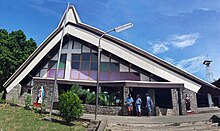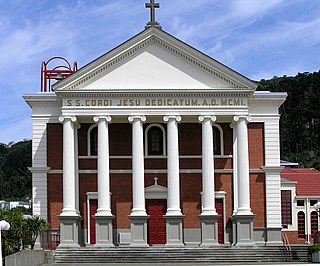
The Catholic Church in New Zealand is part of the worldwide Catholic Church under the leadership of the Pope in Rome, assisted by the Roman Curia, and with the New Zealand bishops.
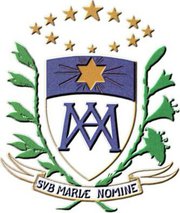
The Society of Mary, better known under the name Marist, is a religious congregation under pontifical right.

The Catholic Church in Fiji is part of the worldwide Catholic Church, under the canonical authority and spiritual leadership of the Pope of Rome.
The Catholic Church in Papua New Guinea is part of the worldwide Catholic Church, under the spiritual leadership of the Pope in Rome. Papua New Guinea has approximately two million Catholic adherents, approximately 27% of the country's total population.

The Archdiocese of Honiara is a Latin Church ecclesiastical territory or archdiocese of the Catholic Church in the Solomon Islands. It is the successor of the apostolic prefecture of the British Solomon Islands, which was erected in 1897. The ecclesiastical province of Honiara was created in 1978, the first such creation of Pope John Paul II, and contains two suffragan sees: Gizo and Auki (1982).
The Roman Catholic Diocese of Gizo is a suffragan diocese of the Roman Catholic Archdiocese of Honiara. It was erected Vicariate Apostolic in 1959 from the Vicariates Apostolic of Northern Solomon Islands and Southern Solomon Islands. In 1966, it was elevated to a diocese and was renamed as the Diocese of Gizo. St. Peter's Cathedral at Gizo is the mother church for the diocese.
The Roman Catholic Archdiocese of Rabaul is a Latin Rite Metropolitan Archdiocese in Papua New Guinea.
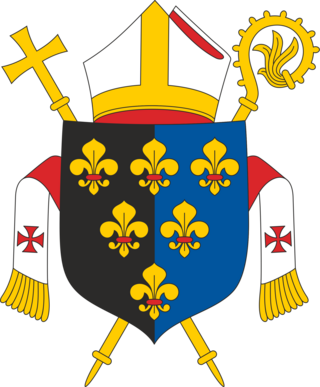
The Roman Catholic Diocese of Bougainville is a suffragan diocese of the Roman Catholic Archdiocese of Rabaul. It was erected as the Prefecture Apostolic of German Solomon Islands in 1898 and elevated to a Vicariate Apostolic in 1930. It was further elevated in 1966 to the Diocese of Bougainville.

The Mission Sui Iuris of Funafuti is a Catholic Latin mission sui juris in Tuvalu, Polynesia.
The Community of the Sisters of Melanesia, more usually called The Sisters of Melanesia, is the third order for women to be established in the Church of Melanesia, which is the Anglican Church of Solomon Islands and Vanuatu.

The Catholic Church in Vanuatu is part of the worldwide Catholic Church, under the spiritual leadership of the Pope in Rome. Catholics constitute 13% of the population of Vanuatu in 2022. The church is organized into one diocese based in the capital of Port Vila.

The Catholic Church in Samoa is part of the worldwide Catholic Church, which, initiated by the life, death and resurrection of Jesus Christ, and under the spiritual leadership of the Pope and Roman curia in the Vatican City is the largest Christian church in the world. Catholic missionaries arrived in Samoa in 1845 and today Catholics account for around 20% of the overall population. Archbishop Alapati Lui Mataeliga was ordained as head of the Archdiocese of Samoa-Apia in 2003.

Honiara is the capital and largest city of Solomon Islands, situated on the northwestern coast of Guadalcanal. As of 2021, it had a population of 92,344 people. The city is served by Honiara International Airport and the seaport of Point Cruz, and lies along the Kukum Highway. In 1983, a Capital Territory – comprising the 22 square-kilometre metropolitan area of Honiara – was proclaimed, with a self-governing status akin to a province, although the city also retained an older role as capital of Guadalcanal Province.
Kakabona (Kakambona) is a peri-urban suburb on the fringe of Honiara, Solomon Islands and is located 4 kilometres (2.5 mi) west of the main center and west of White River on the Tandai Highway. Kakabona borders the Honiara City Council ward of Nggosi. Refugees from Bouganville settled following the conflict.

Vuhokesa is a suburb in Honiara located in the main center on the Tandai Highway and includes the City Council roundabout. Vuhokesa is in the Honiara City Council ward of Vavaea. and is East of Point Cruz and West of Lord Howe Settlement. The Vuhokesa border is the West bank of the Mataniko River which runs into Kua Bay.

The Holy Cross Cathedral, also referred to as the Catholic Cathedral of Honiara, is the cathedral church and seat of the Metropolitan Archdiocese of Honiara. It is located in the city of Honiara, which is on Guadalcanal Island and is the capital of the Solomon Islands, a country in the southwest Pacific Ocean.
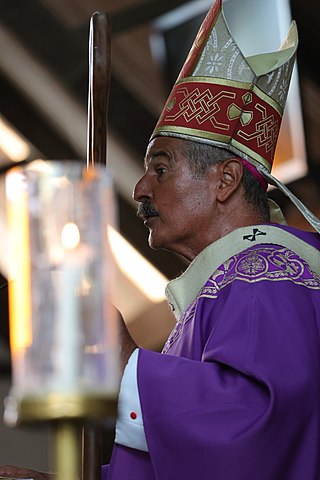
Christopher Michael Cardone, OP is an American prelate of the Roman Catholic Church. Since 2016, Cardone has been serving as archbishop and metropolitan of the Archdiocese of Honiara in the Solomon Islands.
